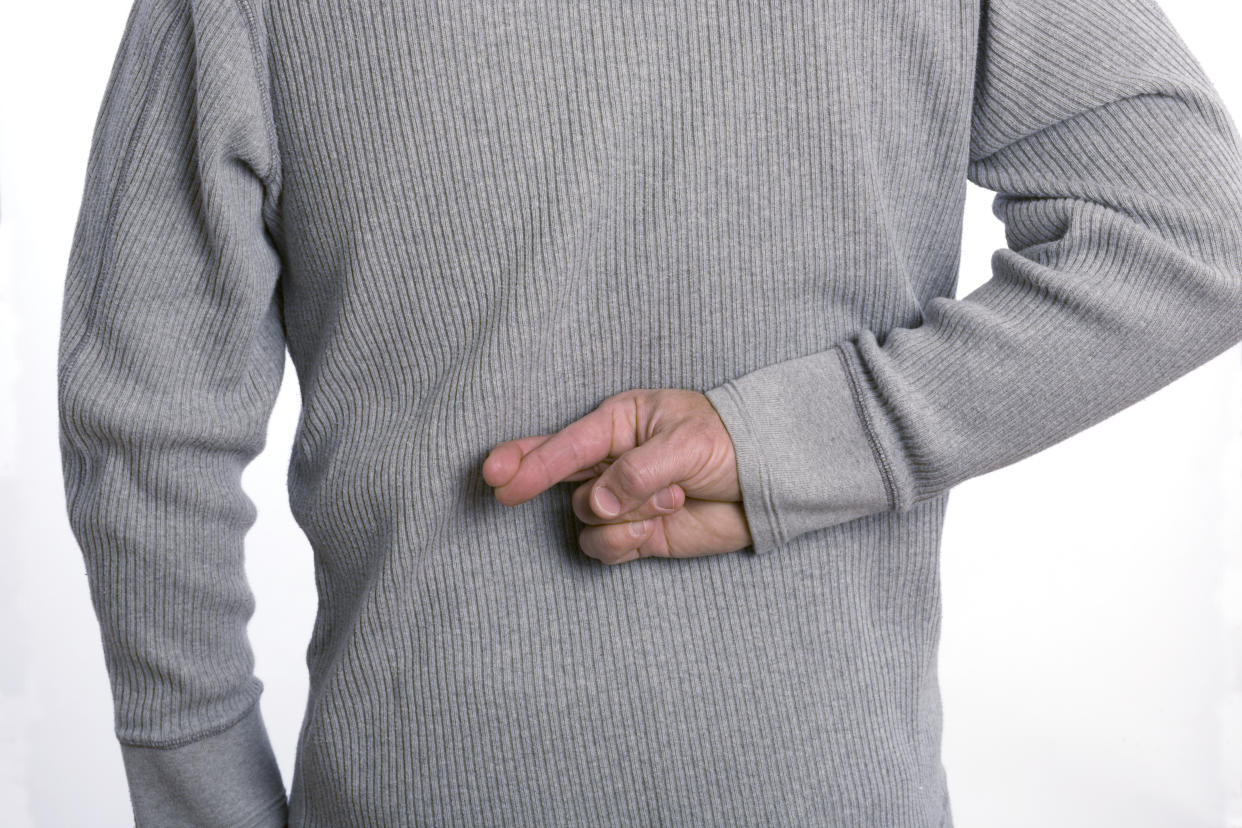How to tell if someone is lying to you: Signs someone is not telling the truth

Many of us would like to know how to tell if someone is lying.
While some people take a hardline stance again fibbing, others don’t mind telling the occasional “white lie” and some have no problem at all with manipulating the truth for their own benefit.
And while there are many occasions in our personal and work life where we may think someone is telling porkies, the reality is it’s often hard to decipher.
Whether it’s catching a friend out on a white lie, a salesperson who’s trying to dupe us or, in more extreme cases, a cheating partner, we can all think of situations where it would benefit us to figure out the real deal.
READ MORE: Is lying about yourself on a dating app ever acceptable?
So how do we go about catching liars out for their behaviour? Here are some signs someone might be lying to you.
They avoid eye contact – or the total opposite
Typically, we associate lying with trying not to meet someone’s gaze, and this still holds true for some, explains body language expert Judi James.
“Eyes are windows to the soul. The human eye has hundreds of small muscles around it making the most microscopic movements send out the most powerful signals,” she tells Yahoo UK.
“This is why people will often try to hide them at the moment of lie, looking down or away in what is called a cut-off gesture.”
READ MORE: Why people cheat and the tell-tale signs to look out for
However, sometimes the opposite is true – and liars will overcompensate with lots of eye contact to give the impression of truthfulness.
“A ‘Performance’ liar might try to act honest by using over-congruent eye contact, staring at you with what they think looks like an innocent expression,” James explains.
They frequently tell white lies to others
Lying has a snowball effect, according to one study, meaning that if you notice someone telling a lot of inconsequential lies, they’re likely to tell bigger ones too.
"When we lie for personal gain, our amygdala produces a negative feeling that limits the extent to which we are prepared to lie," explains study author Dr Tali Sharot, of UCL.
"However, this response fades as we continue to lie, and the more it falls the bigger our lies become. This may lead to a 'slippery slope' where small acts of dishonesty escalate into more significant lies."
They touch their nose
If someone is touching their nose a lot, it might point to a lie.
“According to some research, the Pinocchio effect is based on truth,” explains James. “Blood vessels can swell when we lie making the nose bigger (although not to the naked eye thank goodness!) and this in turn can make it itchy and touch our nose.
She adds: “Nose-touch can also be a cut-off gesture too, aimed at hiding the mouth when we lie.”
They say it online
Multiple studies have found lying over the internet or telling fibs over email is easier than doing it in person – a phenomenon anyone’s who’s ever emailed work to pull a sickie will be familiar with.
They exaggerate
Ironically, if someone repeats words and phrases associated with truthfulness, like “Honestly” and “I’m telling the absolute truth”, before you’ve even questioned the integrity of their account, this can be a sign they are lying, says James.
They might also develop “verbal diarrhoea”, going into graphic detail about their alibi, she adds.
They change the way they speak
The stress of lying can do strange things to people. For some, this will manifest itself in a raised pitch while they speak or shallow breathing, explains James.
They stand differently
Lying can manifest itself in certain changes of posture, explains James.
This could include hunching of the shoulders; overly-gesticulating (i.e. waving the arms a lot); fidgeting; playing with jewellery or hair.
Liars might also assume what’s known as “poker face position” while attempting to look normal, which can involve little movement, putting hands in pockets and sitting on hands.
A word of warning, however. Sometimes, when people know they are suspected of lying, they might start to give “guilty” signals even if they are innocent.
READ MORE: Why you shouldn't tell your partner you cheated
This is a phenomenon called the “Othello Error”, explains James, “based on Shakespeare’s play, where Othello mistakes his loving wife’s anxiety and shock signals when he accuses her of cheating for symptoms of guilt.”
What’s more, while body language can be a useful tool to help us decide whether someone is being truthful, it needs to be taken with a pinch of salt.
“Body language and verbal traits should only be taken in context and as part of other symptoms or ‘tells’,” James suggests.



